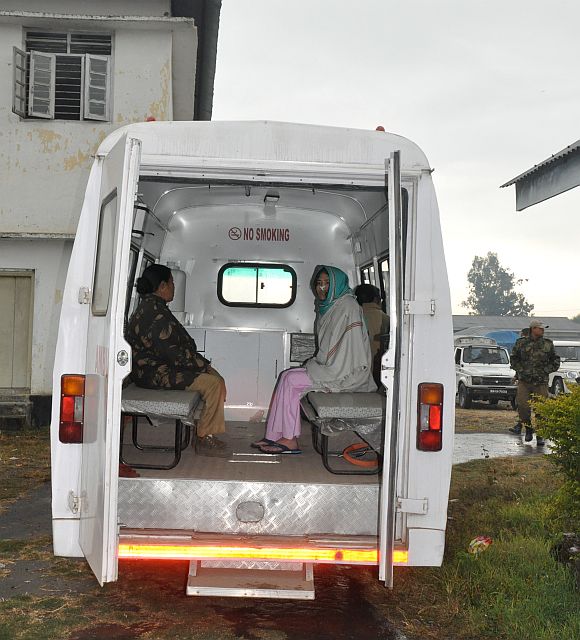
The Iron Lady of Manipur, who has been on hunger strike for 11 years against the Armed Forces Special Powers Act, is an ordinary woman fighting an extraordinary struggle, finds Sumit Bhattacharya.
This is the concluding part of a series on Manipur.
See Part 1: Why you haven't heard the last of the Manipur blockade
Part 2: The land of no Bollywood for the last 11 years
Part 3: What is Manipur's future?
On the cloudy morning of November 30, as you sit in a car outside the chief judicial magistrate's court in Imphal, the capital of Manipur, Delhi band Imphal Talkies N the Howlers' song India, I see blood in your hands (external link) can play as the soundtrack:
India, have you ever crawled down enough to smell the soil of Kashmir...
India, have you ever heard of a lady named Sharmila?
Since November 4, 2000, Irom Chanu Sharmila has been on hunger strike against the Armed Forces Special Powers Act in Manipur. The AFSPA, applicable only in Kashmir and the northeast, gives India's central forces sweeping powers including shooting anyone on suspicion of militant activity.
The government re-arrests Sharmila, 39, every year -- the maximum permissible term for attempted suicide, the charge she is arrested under. A fluid mixture of vital nutrients is pumped into her nose in her hospital ward prison cell to keep her from dying.
November 30, she is being produced in court, a fortnightly ritual in which she is asked questions -- including whether she wants to continue her fast -- and sent back to the hospital.
As the ambulance comes to a halt in front of the magistrate's office, nine police commandos with AK47s get off from the Gypsy piloting it. Inside the new Tata ambulance sit a couple of constables, and Sharmila.
She is wearing a pink phanek, the sarong worn by almost every Manipuri woman. A grey shawl is wrapped around her, and from its depths emerges a tube that goes into her left nose. She looks at you, smiles, turns her head away quickly. It hurts to look at the tube, forget having it on for 11 years.
She gets off the ambulance and walks into the courtroom, where one of her brothers and people from her Just Peace Foundation sit with her in a huddle.
Interviewing Irom Sharmila involves a bureaucratic process that is too long for your stay at Imphal. So you are here to speak to her. But though you are the only journalist, you don't want to intrude. This is the only time she gets with people close to her.
As she emerges from the courtroom, you request a Manipuri friend to ask Sharmila a question in the local language: What does she think of the politics of blockade, which has crippled Manipur as rival tribal groups fight over the proposed demarcation of the district and the government does precious nothing?
Sharmila walks up to you, and says in clear English: "I think the government is really deaf -- regarding governance."
The nails on her big toes are long, light yellow. Her hair is thick black. She is pale. Impossibly thin. But frail she is not, her voice insists.
"The people, their suffering, our suffering, is known by the government and even then they won't change... Misgovernance is the root cause of suffering," she says, fiddling constantly with a piece of bare skin hanging loose from her chapped lips.
She looks into your eyes when she says: "They have no sacrifice."
Please ...
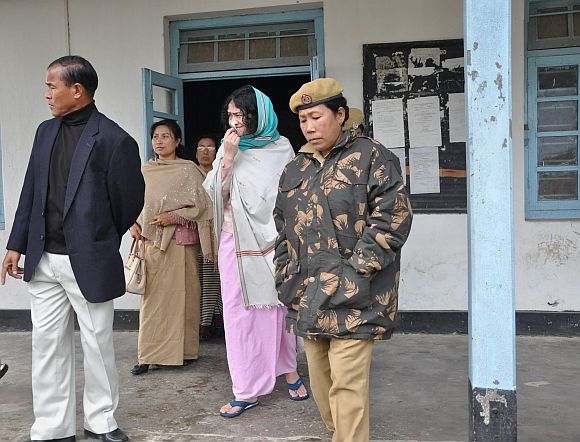
On November 2, 2000, in Malom, Imphal, an Assam Rifles team was marching on Tiddim Road, which connects Imphal with Myanmar, when a bomb exploded in front of them. In return, according to eyewitness accounts, the paramilitary troopers killed 10 people who were standing at a bus stop.
Among them was a 62-year-old woman, and an 18-year-old boy who had won the National Bravery Award for children from the President.
When local newspapers published graphic images and banner headlines the next day, Sharmila took her mother Shakhi Devi's blessings to fulfil what she said was her beholden duty. 'Ima (mother), I am going to do something for the whole nation,' is all she is supposed to have told her mother.
The next day she began her fast against the AFSPA, which gives soldiers immunity from prosecution for murder. Three days later, she was arrested.
Prime Minister Manmohan Singh has said the AFSPA will be replaced with 'a more humane law'. Okaying the AFSPA for one more year, Home Minister P Chidambaram said he shared Sharmila's 'disappointment'. India's new anti-corruption icon Anna Hazare has promised to visit her and support her cause.
She is at the centre of a strong women's movement against militarisation of Manipur that is spearheaded by the Meira Paibis (literally 'women with torches') and Apunba Lup.
But in a country where angry public interest litigations have been filed about a Hollywood actor kissing a Bollywood actress, no one -- not even one of her supporters -- has filed a PIL against the blanket ban on visitors to Sharmila.
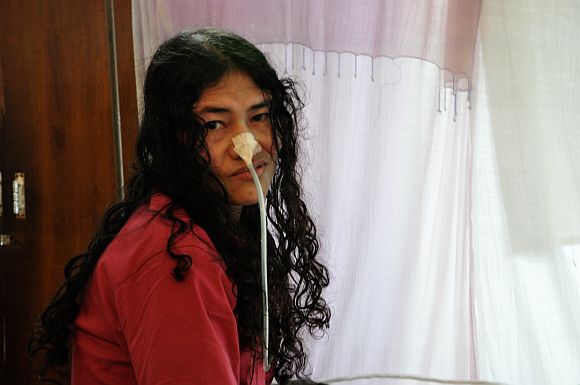
"The security mania around Sharmila is insane," says Babloo Loitongbam, at whose organisation, Human Rights Alert, Sharmila was an intern before she started her fast. "There is no precedent for it, except during the time of (the arrest of) Jayaprakash Narayan, and that too just for a few months. And this for a lady who has never killed a fly."
Others recount an incident in the hospital ward when there were lots of ants on Sharmila's bed. She was not bothered. 'They are only ants, what will they do except bite,' she is supposed to have said.
"She is a deeply spiritual person far removed from petty politics," says another person who has known Sharmila personally over the years. "She will never ask for anything. Even the police who guard her respect her and love her."
"She is an ordinary person undertaking an extraordinary struggle," says Loitongbam. "She is very quiet, and extremely determined."
In 2000, when they were gathering testimonies of victims of human rights violations for an 'Independent People's Inquiry into the Impact of AFSPA in Manipur', Sharmila, Loitongbam says, "was the only person never absent for a single day."
A case that moved her deeply, he says, was that of Mercy, a village headman's daughter-in-law, who was -- according to a police case -- raped by Central Reserve Police Force personnel while her father-in-law and husband were held at gunpoint.
Sharmila gathered eyewitness accounts, statements, facts about the incident as part of her work.
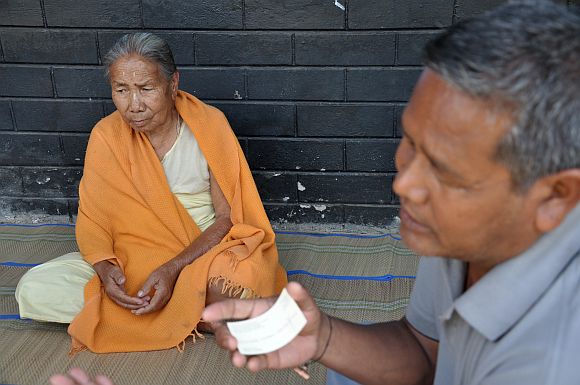
Irom Sharmila comes from a family of strong women. Her mother gave birth to nine children including Sharmila, the youngest, at 44.
Sharmila's paternal grandmother Irom Tonsija Devi, who died in 2008 at age 105, fought in the second Nupi Lan (also called Nupilan or Nupi Lal) or 1939 women's war against the British Raj. Sharmila's father Nando Singh, a state government veterinary department clerk, died in 1989 of cancer.
Those who know Sharmila say she was an average student, and she was always interested in famous people -- Mahatma Gandhi, Nelson Mandela, Martin Luther King.
'After completing school, Sharmila joined a course in journalism in the early '90s,' writes Deepti Priya Mehrotra, author of Burning Bright: Irom Sharmila and the Struggle for Peace in Manipur, 'began writing articles and poetry, and worked with social organisations like the Blind School for Children, and Universal Youth Development Council. She attended seminars and workshops, coming close to several women's organisations. In 1998 she attended a course in nature cure and yoga. In October 2000, she took up a month-long internship with Human Rights Alert.'
Alone in her hospital ward, Sharmila still does yoga. She is allowed to walk in the corridor too. She still writes poems and, rarely, statements she wants to transmit. She loves to read.
After she reads a book, she donates it to the Imphal Public Library, which has gathered a shelf of her books over the last 11 years.
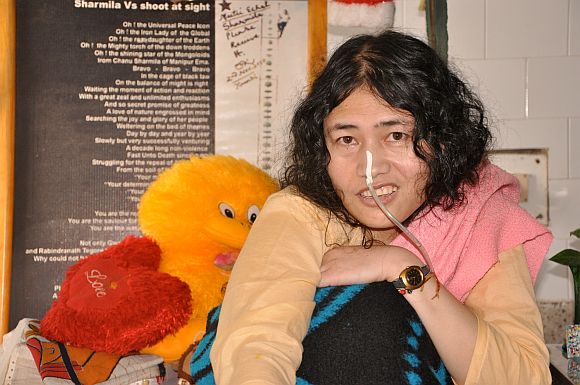
Sharmila is allowed and enjoys being written to, and quite a few people send her books. Some write to her too. Like Desmond Coutinho, the Zanzibar-born, Goan origin, European Union-passport holder man who caused a huge flutter in her life early this year.
Coutinho and Sharmila had exchanged letters -- among the things he sent her were a teddy bear and a Radha-Krishna painting -- and he fell in love with her even without meeting her. When he travelled to Imphal to meet her, he was seen by many as an 'Indian agent' out to kidnap Sharmila away from her struggle.
When the eastern Indian daily The Telegraph published an interview with Sharmila in which she said that she loved Coutinho and that her supporters did not allow him to meet her, it caused a furore in Manipur. Local groups burnt copies of the newspaper and banned it from the valley till the newspaper apologised.
Coutinho sat on a 36-hour fast to be allowed to meet Sharmila during the one-day window she gets every year outside her prison.
'The man in charge of her supporters never relented and never gave permission for us to say our farewells,' he told the Asian Window.
"Coutinho was insensitive to the cultural nuances, it was unfortunate," says Babloo Loitongbam, who is a key person in Sharmila's Just Peace Foundation. "Our position is that this is entirely her private matter, she is free to decide what she wants to do... Once AFSPA is removed... She is absolutely free to decide whether she should marry anyone."
Coutinho did not respond to rediff.com's e-mails. Some said he does not want to put Sharmila in any more discomfiture.
Back at the Imphal courthouse, you realise you can get one more question in before the police commandos intervene. She seems taken aback by the question.
"What do I miss the most?" she repeats, as if no one has asked her that. Her eyes widen. She tries to say something, then laughs.
"Let it be," she says, still laughing, before she gets back into the ambulance in one swift motion.